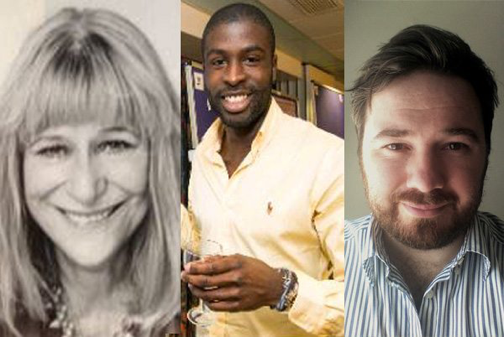
Ramsay Award Program 2016 Team 2: Dr. Fane Mensah (center), pictured with Dr. Geraldine (Jo) Cambridge of UCL (left) and Dr. Chris Armstrong of the University of Melbourne (right).
- What sparked your interest in studying ME/CFS and putting together this intercontinental team effort?
FM: As a young scientist, I have always been up for a big challenge. I also personally wanted to work on a research project in which I could have a positive clinical input. There is currently no drug therapy for ME/CFS and therefore this seemed to me to have huge potential to ‘make a difference’. When I found out that I would have the possibility to work on my favourite immune cell (B cells) in a condition largely neglected by biomedical research I had made up my mind very quickly and agreed to work on the project at UCL.
Christopher [Armstrong] and I were on the committee of young scientists at the Invest in ME meeting in London in June 2016 and we both gave a presentation about our respective research projects. It was not the first thing we would have in common! Straight after our presentations, we started to talk about each other’s experiments and found out that the two different fields we were working in (Immunology and Metabolomics) could be complementary. It was the encouraging words and support from Dr. Nahle at the same conference that boosted our confidence to proceed.
- Has the Ramsay Award Program funding been a helpful investment in your work?
FM: Ramsay Award funding has been a major boost to this collaboration, not just financially but also scientifically as it enabled us to set up a young international collaboration. With the Ramsay award, we are able to investigate important aspects of B cell maturation not only in ME/CFS but also to understand the basic immunology and metabolomics of B cells in culture.
Although it is very rare to have two young scientists establishing something like as comprehensive as this, the success of other major collaborations between key centres has accelerated research in many other areas and we hope the same will happen here. Due to the Ramsay award, I think we have also managed to send out a statement of how two young research thousands of miles apart can collaborate on an ME/CFS project. We have set an example which hopefully many will follow.
- Why is the application of metabolomics to the study of immunology in ME/CFS such a promising intersection?
FM: The field of immuno-metabolism is a fast-growing field in biomedical science. It is also very clear that these two fields both play a very important role in ME/CFS. It is well known that immune issues have often been associated with ME/CFS (B cells, NK cells T cells etc.) and that a ‘wrong’ response to infection may trigger the chronic symptoms. More recently, different groups, including Christopher and his colleagues, have studied changes in the metabolic profile in ME/CFS patients. Their data are consistent with alterations in glycolysis and oxidative phosphorylation leading to different pathways of energy utilisation which could lead to mitochondrial stress and also contribute to the delayed exhaustion in patients with this condition. Co-operation between a number of immune (and non-immune system) cells is necessary for both initiating and turning off the immune response to microorganisms and also for continuing the healthy ‘symbiosis’ with commensal (non-harmful) organisms in the gut, for example. We, therefore, wanted to investigate different ways of stimulating immune cells and measuring their function in parallel with their metabolic capacities, in ME/CFS patients and healthy controls.
- What prompted you to focus in on B cell maturation and differentiation?
FM: Our initial studies were sparked by the promising rituximab trials in Norway, and the strong possibility that an aberrant response to an initiating infection may be involved. B cells are highly dynamic. Every day approximately 100 million ‘new’ B cells enter the circulation and either mature through a complex maturation sequence which is highly compartmentalised or, in the absence of the correct signals, will die within 2-3 days. We firstly studied and compared the phenotypes of B cells between healthy controls and ME/CFS. Here we found no differences between the two cohorts, but we did find interesting features in ME/CFS patients related to the high expression of a molecule associated with B cell maturation and differentiation, and also an increased percentage of B cells which have a role in responses to viruses in particular, which we wanted to explore. In our initial experiments with Christopher, we found that B cells were very metabolically active, which was therefore useful to follow in order to investigate metabolic problems found in ME/CFS patients. In addition, these metabolic activities in B cells differed throughout maturation and differentiation and in response to different stimuli.
- What can you share about progress to date in your research?
FM: We devised a very comprehensive approach which we first needed to test, to determine whether plans to investigate patients’ blood samples were feasible. So far, we are happy to that our experimental design is robust, and we were quite overwhelmed by how much data we will be able to generate. We have also identified some cell surface markers that could tell us something about the metabolic state of B cell subsets throughout maturation. Now that we have set up this system, we have the means through which to see how healthy B cells and ME/CFS B cells compare when stimulated under different conditions. We will, therefore, test a variety of stressors, metabolites, B cell activators, metabolic pathway inhibitors and cytokines in this system.




